(1)简单句、并列句及复合句
- 格式:doc
- 大小:52.00 KB
- 文档页数:4
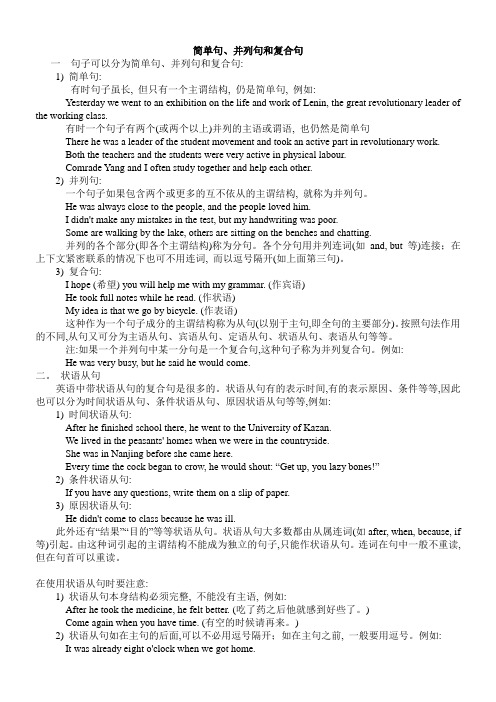
简单句、并列句和复合句一句子可以分为简单句、并列句和复合句:1) 简单句:有时句子虽长, 但只有一个主谓结构, 仍是简单句, 例如:Yesterday we went to an exhibition on the life and work of Lenin, the great revolutionary leader of the working class.有时一个句子有两个(或两个以上)并列的主语或谓语, 也仍然是简单句There he was a leader of the student movement and took an active part in revolutionary work.Both the teachers and the students were very active in physical labour.Comrade Yang and I often study together and help each other.2) 并列句:一个句子如果包含两个或更多的互不依从的主谓结构, 就称为并列句。
He was always close to the people, and the people loved him.I didn't make any mistakes in the test, but my handwriting was poor.Some are walking by the lake, others are sitting on the benches and chatting.并列的各个部分(即各个主谓结构)称为分句。
各个分句用并列连词(如and, but 等)连接;在上下文紧密联系的情况下也可不用连词, 而以逗号隔开(如上面第三句)。
3) 复合句:I hope (希望) you will help me with my grammar. (作宾语)He took full notes while he read. (作状语)My idea is that we go by bicycle. (作表语)这种作为一个句子成分的主谓结构称为从句(以别于主句,即全句的主要部分)。

英语句子结构分类英语句子结构分类:简单句,并列句和复合句的概念及区别1.简单句:无论句子长短,只包含一套主谓结构,句子中个个成分都是单词或短语。
有时主语或谓语可以是并列结构。
请划出下面句子的主谓宾成分。
The accident happened yesterday afternoonOur English teacher is thirty years old.He put the dictionary in the backpack.Grandma told me an interesting story last night.She kept the door open.My classmates and friends all received my Christmas cards and thanked me very much.2.并列句: 由并列连词and/but/or/so/however/for等把两个或两个以上的简单句连接起来。
如:Come here and I’ll help you. 请划出两个分句并判断各分句的成分。
并列连词:一、表转折的并列连词主要有but(但是), yet(可是), while(而,却)等二、表选择的并列连词主要or (或者,还是,否则), either, or (不是、就是), neither, or,(既不、也不) otherwise (要不然)等。
三、表联合的并列连词主要有and, not only, but also,(不但,而且), when(=and just at this time 就在这时)等。
四、表因果的并列连词主要有for(因为), so(因此)等。
并列句例句:1. This is the custom of China. They are not like us to finish it in one drink, _____but_____prefer to drink by taking a small amount at a time.2. My mother wants to decorate our rooms in a modem look__while_____my father prefers a traditional style.3. It was time for her to have a new baby, ___and____it was also time for the young panda to independent.4. He is a shy man,__but/yet_______he is not afraid of anything or anyone. 解析:But/yet转折连词。
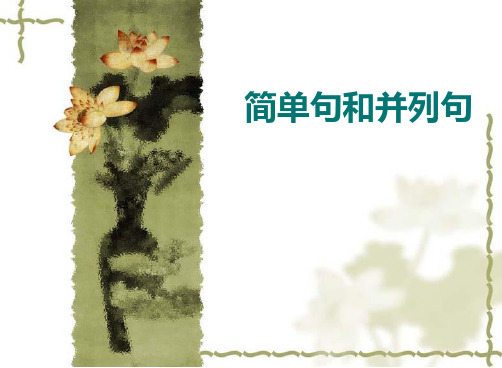
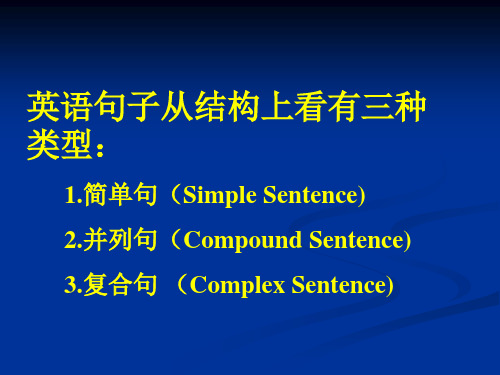
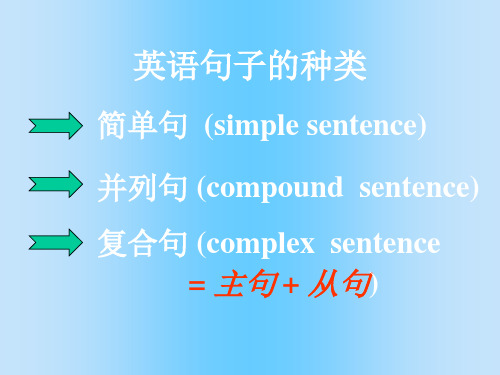
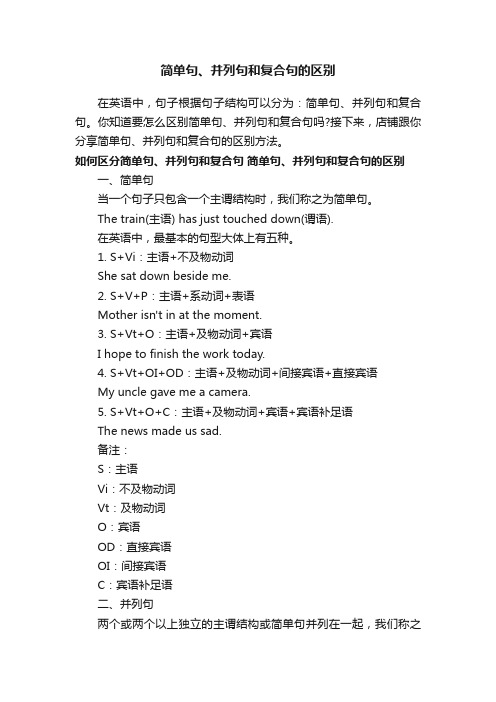
简单句、并列句和复合句的区别在英语中,句子根据句子结构可以分为:简单句、并列句和复合句。
你知道要怎么区别简单句、并列句和复合句吗?接下来,店铺跟你分享简单句、并列句和复合句的区别方法。
如何区分简单句、并列句和复合句简单句、并列句和复合句的区别一、简单句当一个句子只包含一个主谓结构时,我们称之为简单句。
The train(主语) has just touched down(谓语).在英语中,最基本的句型大体上有五种。
1. S+Vi:主语+不及物动词She sat down beside me.2. S+V+P:主语+系动词+表语Mother isn't in at the moment.3. S+Vt+O:主语+及物动词+宾语I hope to finish the work today.4. S+Vt+OI+OD:主语+及物动词+间接宾语+直接宾语My uncle gave me a camera.5. S+Vt+O+C:主语+及物动词+宾语+宾语补足语The news made us sad.备注:S:主语Vi:不及物动词Vt:及物动词O:宾语OD:直接宾语OI:间接宾语C:宾语补足语二、并列句两个或两个以上独立的主谓结构或简单句并列在一起,我们称之为并列句。
各个简单句间是平行并列的关系,而非从属关系。
并列句的各个分句间可用逗号、分号、起连接作用的副词或并列连接词来连接。
1. 能连接并列句的连词and(和,又),but(但是),for(因为),however(然而),or(或者),so(所以,因而),while(然而),yet(然而)2. 能连接并列句的复合连词or else(否则,要不然),either...or...(要么···,要么···;或者···,或者···),neither...nor...(既不···,也不···),not only...but also(不仅···,而且···)3. 能连接并列句的副词besides(而且,还有),hence(因此),otherwise(否则,要不然),then(然后,于是),therefore(因此,所以),thus(因而,从而) 根据并列分句之间的不同关系,并列句则可以分为以下四种。
简单句、并列句和复合句一、简单句当一个句子只包含一个主谓结构时称为简单句。
简单句大体上可以分为下面五种类型:1.主语+谓语The plane has landed.He sat down beside me.2.主语+系动词+表语表语可以是形容词、名词、代词、副词、分词、不定式、介词短语、从句等。
The medicine tastes horrible.3.主语+谓语+宾语Who can answer this question?Lots of people are applying for the job.4.主语+谓语+间接宾语+直接宾语My uncle gave me a ticket.I showed my passport to one of the immigration officers.从以上例句可见,短的间接宾语(如me,them,Jane)都放在前面,较长的都放到后面。
至于加to还是for要根据动词决定。
5.主语+谓语+宾语+补语宾语和补语一起构成复合宾语。
补语的作用就是为宾语补充一些重要的信息资料。
They appointed him managing director.在以上五类句子中,有些句子,如祈使句,主语一般省略掉。
Show me your passport.二、并列句并列句的两部分可用分号(;)连接。
It was getting late;she had to hurry to the station.但更多的并列句都包含一个并列连词,把两部分连接起来,这两部分可称为分句,也可称为并列分句。
英语中的并列连词有:and, but, for, or, so, yet, nor,not only...but(also),either...or,neither...nor等,由它们连接并列分句。
He shook his head,for he thought differently.三、复合句包含一个主句和一个或几个从句的句子叫复合句,从句由从属连词或关系代词引导。
二、简单句、并列句和复合句(一)句子种类两种分类法1、按句子的用途可分四种:1)陈述句(肯定、否定):He is six years old; She didn't hear of you before.2)疑问句(一般、特殊、选择、反意):Do they like skating? How old is he? Is he six or seven years old? Mary can swim, can’t she?3)祈使句:Be careful, boys; Don't talk in class4)感叹句:How clever the boy is!2、按句子的结构可分三种:1)简单句:只有一个主语(或并列主语)和一个谓语(或并列谓语)。
e。
g. He often reads English in the morning。
Tom and Mike are American boys。
She likes drawing and often draws pictures for the wall newspapers.2)并列句:由并列连词(and, but, or等)或分号(;)把两个或两个以上的简单句连在一起构成.e。
g. You help him and he helps you。
The future is bright; the road is tortuous。
前途是光明的,道路是曲折的。
3)复合句:含有一个或一个以上从句的句子。
复合句包含:名词性从句(主语从句、宾语从句、表语从句和同位语从句)、定语从句和状语从句等。
e。
g. The foreign visitors took a lot of pictures when they were at the Great Wall。
(二)简单句的五种基本句型1、主语+系动词+表语:e.g. He is a student。
简单句、并列句和复合句句子种类:按句子的用途可分四种:1)陈述句(肯定句、否定句):He is a lovely boy. She didn ' Work hard before.2)疑问句(一般疑问句、特殊疑问句、选择疑问句、反意疑问句):Do you like skating?How much is it? Is he six or seven years old? Lucy can play the piano , can ' t she?3)祈使句:Be on time, please! Don ' t arrive late for school!4)感叹句:How hard-working they are! What a nice girl she is! How time flies!1)简单句:只有一个主语(或并歹0主语)和一个谓语(或并歹0谓语)。
He often reads English in the morning. 一主语,一谓语Tom and Mike are American boys. 并歹U主语,一十胃语She likes writing and often writes articles for newspapers. ——主语,并歹皿胃语简单句的五种基本句型(其他各种句子都可由这一种基本句型扩展、变化或省略而构成。
)①主谓:He left.②主谓宾:Henry bought a dictionary.③主谓双宾:My father bought me a car.④主谓宾补:Tom made the baby laugh.⑤主系表:He is a student.主语:句子说明的人或事物。
谓语:说明主语的动作、状态和特征。
表语:系动词之后的成分,表示主语的性质、状态和特征。
宾语:1.动作的承受者一一动宾。
2.介词后的名词、代词和动名词一一介宾。
简单句、并列句及复合句1.[简单句] 当一个句子只包含一个主谓结构时称为简单句。
简单句大体可以分为下面五种类型:(1)主语+系动词+表语:(表语可以是形容词、名词、代词、副词、分词、介词短语、从句等)The flowers are sweet. 花很香(形容词)She is a clever girl. 她是一个聪明的女孩(名词)The handbag is mine. 手提包是我的(代词)Mother isn’t in at the moment. 妈妈此刻不在家(副词)The dish looks inviting. 这盘菜看起来很诱人(现在分词)She seemed well pleased. 她似乎很高兴(过去分词)Jane looks like her mother. 简的模样很像她妈(介词短语)That’s how I look at it. 这是我对它的看法(从句)(2)主语+动词(不及物动词)The bell rang. 门铃响了动词时态可以改,也可以有它的修饰语(状语)The bell is ringing loudly now. 门铃现在正大声地响着The bell has rang for 3 minutes. 门铃已经响了三分钟了(3)主语+动词+宾语(及物动词后直接加宾语,不及物动词需加适当的介词或副词)(A)I play football. 我踢足球。
(play 为及物动词)动词时态可以改,如:I was playing football at 10:00 yesterday. 我昨天十点时正在踢足球I have played football for 2 hours. 我已经踢了两个小时的足球了(B)She listens to music. (listen为不及物动词,后加介词to 再加宾语)We put the meeting off. (put 常与副词off连用,表推迟,宾语可居中) 以上宾语可由名词、代词、数词、不定式、动名词、从句等表示:They’re playing chess. 他们在下棋(名词)I have nothing to do today. 我今天没事干(代词)She wants two. 我要两个(数词)I hope to finish the work today. 我希望今天完成这项工作(不定式)I hate asking favors. 我不喜欢求人帮忙(动名词)You see what I mean. 你明白我的意思吗(从句)(4)主语+动词+间接宾语+直接宾语She gives me an apple. 她给我一个苹果一般间接宾语在前,直接宾语在后,也可把位置调换,但要加介词to 或forShe gives an apple to me. 她给我一个苹果She bought a skirt for her daughter. 她买了一件裙子给她女儿(5)主语+动词+宾语+补语(补语和宾语一起构成复合宾语,其作用是为宾语补充一些重要信息,补语可以是名词、形容词、不定式、现在分词或过去分词)They appointed him managing director. 他们任命他为总经理(名词)She painted the walls green. 她把墙漆成绿色(形容词)He told me to be more careful. 他让我仔细一点(不定式)I smelt something burning. 我闻到有东西烧焦味(现在分词)I have my hair washed. 我洗头了(过去分词)在以上五类句子中,有些句子,如祈使句,主语可省Show me your passport. 出示你的护照Paint the walls green. 把墙涂成绿色有些有并列成分,如两个主语、宾语、动词等:Tom and Jack are in the same class. 汤姆和杰克在同一个班He ordered a bee steak and a soup. 他叫了牛排和一份汤She came forward and shook hands with us. 她走上前和我们握手2. [并列句] 由两个或更多独立的主谓结构或简单句并列在一起的称为并列句。
这些独立句往往在意义上有所关联,否则会分成独立句子,不会连成并列句。
并列句的两部分可用分号连接。
英语中的并列连词有: and, but, for, or, so, yet, nor, not only…but (also), either…or, neither…norI like singing; she likes dancing. 我喜欢唱歌,而/但她喜欢跳舞I like singing, and/but she likes dancing.I’ ve got a cold, so I’ m going to bed. 我感冒了,因此我要去睡觉了The days were short, for it was now December. 白天很短,因为现在已经是十二月了You must hurry or you won’t make it for the train. 你得赶快,否则你会赶不上火车了还有一些副词也起连词作用,如:I think: therefore I am. 我思故我在3. [复合句] 一个句子如果有一个或多个成分由从句担任,它就是复合句。
它包括:(1) 名词性从句。
它在句中可担任主语、宾语、表语、介词宾语等That the match will be cancelled is now certain. 球赛将取消已经是肯定的了(主语)How it happened is a mystery to me. 这些是怎么发生的对我是一个谜(主语)I know (that) you’ll succeed. 我知道你们是会成功的(宾语)I wonder if you could stay for another day. 不知你可否再待一天(宾语)The question is whether they have signed a contract. 问题是他们签没签合同(表语)That’s why I object to the plan. 那就是我反对这个计划的原因(表语)It all depends on how we make the preparation. 这都取决于我们的准备工作做得怎样(介词宾语)I’m obliged to you for what you have done for us. 我很感激你对我们的帮助(介词短语)There is a rumour that he has married a widow. 有谣言说他和一个寡妇结了婚(同位语)The idea that money means everything is unsound. 金钱万能的思想是错误的(同位语)(2) 关系从句(定语从句),多由关系代词或关系副词引起A.由关系代词引起(that, who, whom, which, whose):This is the book which /that was on the table. 这就是桌上那本书(先行词指物,关系代词在从句中当主语,不可省)Jim introduced me to a girl who/that sat next to him. 吉姆把我介绍给坐他旁边的那女孩。
(先行词指人,关系化词在从句中当主语,不可省)This is the book (which/that)I borrowed yesterday. 这是我昨天借的书(关系代词在从句中当宾语,可省)She is the person (that/whom) I spoke to just now. 她就是刚才跟我说话的那个人(关系代词在从句中当宾语,可省)The girl whose book is here is away. 书在这里的那个女孩走了(先行词当定语)只用that, 不用which的有:1)You must do everything that I do. 你必须做我所做的每件事(先行词是all, little,much, few, nothing, everything 的,后用that)2)The only thing that we should do is to study. 我们唯一须做的事是学习。
(先行词前出现the only, the same, the last, the very 的用that)3)You can take away any book that is on the table. 你能拿走桌上的任何书(先行词被all, some, any, much, little, few 所修饰时,只用that)4)This is the best book that I have ever read. 这是我看过的最好的书。
(先行词前出再最高级及序数词,只用that)5)We talked about the things and persons that we are interested in. 我们谈论我们感兴趣的物和人(先行词既指人又指物时用that)只用which 不用that的情况有:1)This is the train by which we went to Guangzhou. 这是我们去广州所坐的火车(先行词后有介词,只用which)2)He said that which was not interesting. 他说那些不好玩的话(先行词是that 时,只用which,避免重复)3)At the station I bought some magazines that might help me pass the time on the trainand which I could pass on to the others when I finish them.在车站,我买了一些既可以帮我在为车上消磨时间,又可以在看完后给别人看的书(当句子有两个从句,前面用that 引导,后面要用which)4)My mother bought me a book, which I like very much. 我妈妈买了一本我很喜欢的书(在非限制性定语从句中,不能用that,只能用which)B.由关系副词引起(when, where, why)1)I will remember the day when I went to Beijing. 我会记得我去北京的那天(go为不及物,要加介词后才可用which,所以在此不可用which而用when,若要用which需加in, 即I will remember the day in which I went to Beijing.)对比:I will remember the day which I spent with you.(spend 是及物动词,可用which)2)This is the city where we lived before.(live为不及物,需用where,相当于in which)对比:This is the city which we visited before.(visit为及物动词,可用which)3)This is the reason why I came here. 这就是我来这里的原因。